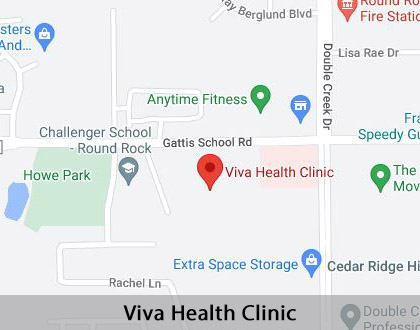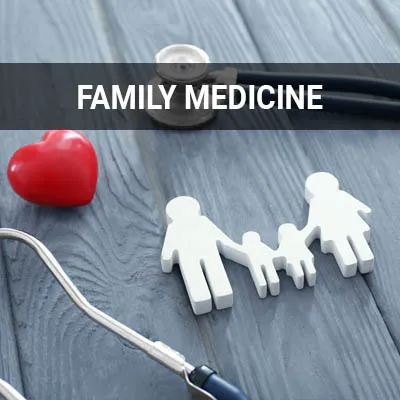Pediatric Care Round Rock, TX
Pediatric care is a specialty medicine, with practitioners trained specifically to treat the needs of children and young adolescents. Think of them as primary care practitioners for kids. Minor injuries and illnesses are simply part of being a child. However, if a child's illness or injury is serious, the parent or guardian should seek the help of a primary care and pediatric practitioner.
A primary care practitioner can help maintain and improve your child's health. Primary and pediatric care is available at Viva Health Clinic in Round Rock and the surrounding area. Call us at (512) 243-5872 for more information or to make an appointment today.
When Pediatric Care is Needed
While preventing a child from getting injured or falling ill is the most ideal way to protect the child's health, it is not always practical. Injuries and illnesses can happen regardless of preventive measures. Therefore, determining when pediatric care is needed can help ensure the child has the best chance at making a quick recovery.
If a child suffers from an injury or illness with severe symptoms that last for more than several days, they may have an underlying condition that we can diagnose early. They may also have recurring symptoms or fall sick too frequently, indicating a need to strengthen their immune system. We will discuss the possibilities and the appropriate measures to be taken for each individual child.
According to WebMD, common childhood illnesses include ear infections, colds, and stomach bugs. Fifth disease is a common condition in children between the ages of five and 15. Hand, foot, and mouth disease is another common condition in children under the age of five. However, it is not usually serious if treated early.
“If a child suffers from an injury or illness with symptoms that are severe or last for more than several days, they may have an underlying condition that we can diagnose early.”
Illnesses That Require Pediatric Care
It is normal for children to experience minor illnesses such as the common cold, and they are often able to fight off the infection with little to no medical assistance. However, more serious illnesses may require a visit to the child's primary practitioner to ensure that the symptoms do not begin to worsen or last longer than necessary. The most common illnesses that require immediate care are colds, flu, allergies, and stomach illnesses.
The Common Cold or Flu
A minor case of the common cold or flu does not necessarily need immediate medical attention, especially if no fever is present. However, a cold or flu case that lasts more than several days without improving or symptoms that become severe may need medical assistance. If there is any doubt over whether a child's symptoms are normal, the child's primary care practitioner can help.
Allergies/Allergic Reactions
Additionally, any illness that results from allergies or an allergic reaction may require pediatric care to ensure the symptoms do not worsen, especially for shortness of breath. Unfortunately, children do not know what they are allergic to until they experience it, which means that, as a parent, it is crucial to keep a close eye out for allergic reactions.
Stomach Illnesses
Lastly, stomach illnesses may require immediate treatment since the symptoms can be alarming and painful. If a child suffers from a stomach illness, such as food poisoning, a stomach virus, or any other illness that involves vomiting and diarrhea, notify the child's primary care practitioner right away. Stomach illnesses that include a fever require immediate attention, especially in children.
“The most common illnesses that require pediatric care are colds and flu, allergies, and stomach illnesses.”
Injuries That Require Pediatric Care
Minor scrapes, bruises, and sprains medical assistance. It is possible to treat some pain and symptoms with at-home remedies and proper first aid care. However, more serious injuries, such as cuts, deep bruises, and severe muscle strains, need professional treatment from a primary care practitioner.
An examination is key to determining the full extent of the patient's injury. This way, we can help ensure the child receives the proper care they need. Three types of cases in which pediatric care is needed as soon as possible to ensure proper care include severe sprains and strains, head injuries, and cuts or burns.
Severe Sprains and Strains
One of the most common injuries children suffer is sprains and strains, especially if they are constantly outdoors or participate in sports. While minor sprains and strains are normal and do not need medical assistance, more serious sprains and strains, such as a high ankle sprain or pulled hamstring, may need immediate attention. If there is a visible deformity in the affected area that will not go away or severe pain preventing the use of the area, call your child's primary care practitioner right away.
Head Injuries
Any head injury that your child suffers needs to be properly examined by a medical professional. Head injuries are among the most serious common injuries that children can sustain, and treating the head injury correctly and immediately is essential in preventing any possibility of long-term damage. Call your child's primary care practitioner right away.
Cuts and Burns
Lastly, a cut or burn of any kind may need to be treated as soon as possible, as improper treatment can lead to an increased risk of infection. While a minor scrape can be treated at home with first aid supplies, a primary care practitioner can properly assess cuts and burns to determine the severity and if any stitches, ointments, or medications need to be administered.
“Any head injury that your child suffers needs to be properly examined by a medical professional.”
Check out what others are saying about our primary care practitioner services on Yelp: Pediatric Care in Round Rock, TX
Contact a Primary Care Practitioner
Understanding more severe symptoms can give parents a better understanding of what injuries and illnesses require an immediate call to a child's primary care practitioner. After an injury or illness occurs, there are generally four options: home treatment, primary care practitioner, urgent care, or emergency room.
Our primary care practitioner can treat most injuries and illnesses that are not life-threatening or require surgery. For example, if a child falls ill and needs immediate medical attention to get the non-life-threatening symptoms under control, we can treat them here at our primary care facility. Primary care practitioners also treat common medical conditions, refer children to specialists when needed and encourage children to pursue healthy lifestyles.
Additionally, we are able to treat any injury that does not require immediate surgery. As such, a severe sprain or strain, minor bone fractures, and small cuts and burns can be treated effectively and efficiently by our team. However, deep cuts that are life-threatening, comminuted fractures that need immediate surgery, and head injuries that result in loss of consciousness need immediate treatment at an emergency room with hospital access.
However, the most difficult determination for most parents to make is whether the illness or injury can be treated at home or requires professional medical treatment. While home treatment can be tried initially in most cases, if the symptoms become more severe or last for longer than expected, consult with the child's primary care practitioner to ensure proper treatment is administered.
“Our primary care practitioner can treat most injuries and illnesses that are not life-threatening or require surgery.”
Questions Answered on This Page
Q. When should a child be taken to the practitioner?
Q. What are common illnesses that require pediatric care?
Q. What injuries require pediatric care?
Q. What can a child's primary care practitioner treat?
Q. What happens during a visit with a primary care practitioner?
People Also Ask
Q. What are the benefits of seeking a family practitioner?
Q. What are the different types of treatment used in primary care?
What To Expect From a Primary Care Practitioner
During an appointment, our primary care practitioner will examine the child's injury or illness, documenting their symptoms, medical history, and previous treatment. After gathering as much useful information as possible and running any necessary tests, we will examine the information and use it to make an accurate diagnosis.
If a child has an injury, we will focus on controlling and treating the initial symptoms, typically including pain management. After making a diagnosis, we will discuss treatment options and decide on the fastest and most effective option. Additionally, we will answer any questions about the diagnosis and treatment process.
On many occasions, there is not a need for a secondary visit, and the treatment can be administered in the comfort of your own home. However, for more serious illnesses and injuries, a follow-up visit is recommended. Also, if symptoms do not improve from treatment, give us a call and to discuss a better form of treatment. However, in most cases, children are likely to make a full recovery without a second visit.
“After gathering as much useful information as possible and running any necessary tests, we will examine the information and use it to make an accurate diagnosis.”
Frequently Asked Questions
Q. What are immunizations? How do I know what immunizations my child needs?
A. Immunizations, often referred to as vaccines, are a form of preventive treatment, usually in the form of an injection, where a small sample of a particular substance is placed into the body in order for the body to learn how to fight it off. By being able to fight off the infection, it builds up an immunity to the substance, meaning it is no longer affected by the substance and can easily fight it off in the future. In order to determine what all immunizations are needed in children, come in for a visit or give our primary care facility a call.
Q. My child is sick, but she seems to be okay. How do I know if I should take her to her pediatrician or not?
A. For most minor illnesses, you can provide treatment at home, which typically includes over-the-counter medication, rest, and staying hydrated. However, if they have symptoms that begin to worsen despite home treatment, be sure to seek medical assistance to get the symptoms under control. Additionally, any illness that lasts for more than several days requires a call to our primary care practitioner to ensure that the illness is not causing more discomfort than necessary. If there is ever a concern for any other reason, do not hesitate to call.
Q. What precautionary measures should I take to prevent my child from getting sick?
A. Preventing illness is not always possible. However, there are certain precautions you can take to minimize the risk. First and foremost, teach your child to practice good hygiene, such as washing their hands several times each day, not rubbing their hands on their face, and not using their hands to cover their mouth when they sneeze. After all, germs in the form of bacteria or a virus are the main cause of illness. If your child can prevent germs from entering the body, your child has a much better chance to stay healthy.
Q. I am worried about my child's head injury. Will there be any long-term consequences?
A. In most cases, a minor head injury does not lead to long-term complications as long as proper treatment is administered promptly. However, in the event that several head injuries occur within a short amount of time, it may be a good idea to consider lifestyle changes, as they can pose a long-term risk.
Q. I am not sure what I can take my child to a primary care practitioner for?
A. A Primary Care Practitioner is someone you can take your child to for routine checkups, non-emergency medical care, and immunizations. Often a PCP oversees the child's care and refers them to specialists when necessary.
Start Feeling Better – Visit Us Today
By visiting us as soon as possible, our team can help get you the professional treatment you need. Instead of waiting around and allowing the symptoms to get worse, we can provide you with treatment options.
Definition of Medical Terminology
Call Us Today
To ensure your child's pain, discomfort, and symptoms do not worsen or last for longer than necessary, make an appointment with our primary care practitioner. Our team at Viva Health Clinic can help. Call us at 512-243-5872 to learn more about our services or schedule an appointment.
Helpful Related Links
- American Academy of Family Practitioners. American Academy of Family Practitioners. 2023
- American Academy of Pediatrics (AAP). American Academy of Pediatrics (AAP). 2023
- American Journal of Medicine. American Journal of Medicine. 2023
- American Medical Association (AMA). American Medical Association (AMA). 2023
- Asthma and Allergy Foundation of America. Asthma and Allergy Foundation of America. 2023
- CDC Overweight & Obesity. CDC Overweight & Obesity. 2023
- Stanford Children’s Health. Stanford Children’s Health. 2023
- The AAP Parenting Website. The AAP Parenting Website. 2023
About our business and website security
- Viva Health Clinic was established in 2023.
- We accept the following payment methods: American Express, Cash, Discover, MasterCard, and Visa
- We serve patients from the following counties: Williamson, Travis, McLennan
- We serve patients from the following cities: Pflugerville, Austin, Kyle, Waco, Leander, Cedar Park, Bastrop, Round Rock, Georgetown, Hutto, Liberty Hill, and Taylor
- National Provider Identifier Database (1104428416). View NPI Registry Information
- Norton Safe Web. View Details
- Trend Micro Site Safety Center. View Details
Back to top of Pediatric Care










